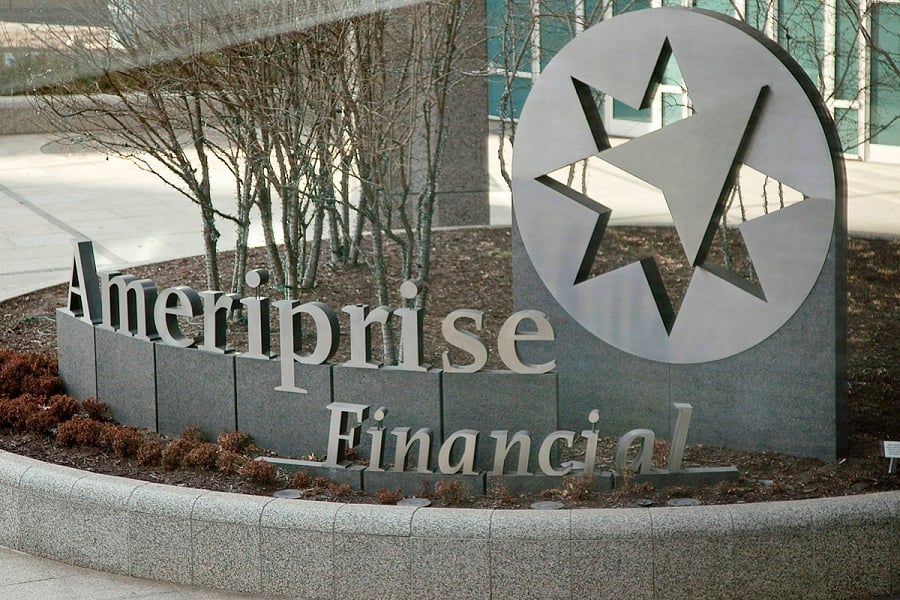Ameriprise Financial Inc. Thursday settled a four-year-old lawsuit that was filed by its own retirement plan participants who claimed the company cost them millions of dollars in excessive fees.
The case, which was filed in the U.S. District Court in Minnesota, was set to go to trial on April 13. Instead, Ameriprise and the plaintiffs agreed on a settlement of $27.5 million, filing with the court a joint motion of approval for the settlement. The financial services giant denied the allegations and stood by its finding that it did not commit any fiduciary breaches.
“We have a strong 401(k) plan that is administered for the sole interests of participants,” Ameriprise spokesman John Brine said. “The settlement doesn't require any changes to our plan, which will maintain the existing broad and competitive selection of options and features.”
Mr. Brine added that the plan has always featured funds managed by the firm as well as investment options from other providers, and a brokerage window.
(More: New areas for 401(k) lawsuits emerge)
Nevertheless, the settlement came with a variety of non-monetary improvements to the plan.
“The non-monetary relief obtained, in addition to the financial terms, not only significantly benefits Ameriprise's employees and retirees, but also sets a standard for best practices for plan sponsors,” the plaintiffs' attorney, Jerry Schlichter, managing partner at Schlichter Bogard & Denton, noted in a statement.
“Competitive bids and enhanced communications and disclosure will increase the value of the employees' and retirees' 401(k) plans for years to come,” he said.
This case is one of many 401(k) excessive fee and fiduciary breach suits pursued by Mr. Schlichter. Most notably, he is also representing the plaintiffs in
Tibble v. Edison, a pivotal 401(k) fiduciary breach case that's being considered by the U.S. Supreme Court.
BREACH OF FIDUCIARY ALLEGATIONS
In 2011, Roger Krueger and a group of Ameriprise plan participants
filed suit against the firm and the committees that oversaw its employee benefits administration and 401(k) investments.
The Ameriprise plaintiffs claimed that investments in the company's 401(k) plan included funds from the firm's subsidiary RiverSource Investments, which is now known as Columbia Management Investment Advisers.
(More: 401(k) bond funds get a makeover)
Plaintiffs also said that RiverSource and Ameriprise Trust Co., which was the record keeper of the plan, received fee revenue from employees' plan dollars. The plan participants also allege that the funds were costly. For instance, they alleged in their suit that the cost of target date funds from RiverSource ranged from 84 to 92 basis points, which was 74 basis points more than an alternative from Vanguard.
IMPROVEMENTS AHEAD
Though Ameriprise will not be changing its plan per the settlement, the agreement requires the company to conduct a request-for-proposal bidding process for recordkeeping services and investment consulting services, along with
a number of other updates to its processes for the next three years.
(More: Retirement plan advisers are preparing for major changes)
The agreement calls on Ameriprise to continue refraining from receiving payment for administrative services provided to the plan other than reimbursement of direct expenses from the plan, to continue paying fees to the record keeper on either a flat fee or per-head basis, provide necessary disclosures of plan fees to the participants and to consider the use of collective investment trusts and separately managed accounts.
Most notably, the plan's fiduciary committee for investment selection will not include any member who is an executive with Columbia Management Investment Advisers or its investment management affiliates.
Mr. Brine at Ameriprise said that they never had a member who is an executive with Columbia on the fiduciary committee for investment selection, and that this was from inception. “We did this voluntarily,” he said.







